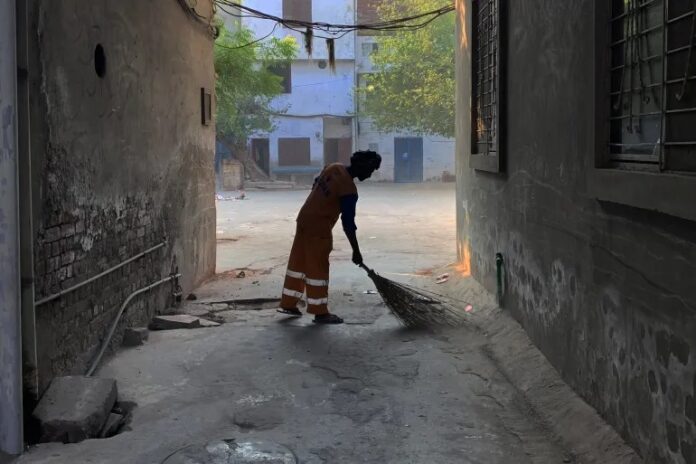Sargodha, Pakistan – It is just before 4am on a chilly November morning and Maryam Bibi, 34, is waiting in a small, musty room for her 16-year-old son Suleman to get ready so they can leave for work.
They will start work before sunrise, as they do seven days a week, collecting the trash from people’s homes and sweeping the streets.
A single bulb attached to exposed wires hangs over the door of the room where Maryam’s five other children, four of them younger than Suleman, all sleep.
Maryam unplugs the bulb from the socket and their bare, two-room home plunges into darkness. She needs to charge her phone on the only power socket before heading out for the day.
After a rushed breakfast of tea and stale bread, Maryam and Suleman hop on a rickety motorbike and make their way through the winding streets of a sleeping Sargodha, Pakistan’s 12th largest city, sandwiched between the Jhelum and Chenab rivers in the central-eastern province of Punjab.
It is still dark out, and the mother-son duo is headed to a small residential neighbourhood where they will spend their morning picking garbage for a combined monthly salary of 16,000 rupees ($55.43) that must sustain their family of eight.
“Ammi [mother] tells me to go back to school, that she will do the work herself, but I just can’t. Not anymore,” says Suleman as he pulls on a worn-out pair of suede gloves bought at a flea market.
He uses these gloves to protect his hands while rummaging through garbage cans.
“It’s my responsibility to look after my siblings now that Abbo [father] is gone.”
Suleman, a soft-spoken teenager, had dreamt of one day joining the police force. He knows how unlikely that is now that he has had to step up and help his widowed mother run the household.
Suleman’s father Nadeem died over a year ago when he drowned in a blocked sewer.
As she begins her busy day, Maryam admits that she and her children “don’t even have the luxury of sitting at home and grieving their loss”. With bare hands, and dressed in a tattered shalwar kameez and chador, she knocks on one door after another, swiftly collecting trash into a rusty wheelbarrow as Suleman follows, intently observing his mother, learning the job he inherited from his late father.
A death trap
Thirty-eight-year-old Nadeem Masih (a common surname among Pakistani Christians that means Messiah in Arabic and Urdu) had worked with the local sanitation corporation for nearly half his life. For 17 years, he was paid a daily wage, as he waited for a permanent contract that would legally grant him the status of a permanent government employee and secure him a legal minimum wage, paid leave, and other social benefits.
At around 10pm on Sunday, October 3, 2021, Nadeem and several other workers received a phone call from their supervisor, urgently summoning them to clean a blocked sewage line in the city centre.
“He didn’t want to go because it was his day off, but the supervisor threatened him [by saying he’d fire him if he didn’t go], so I also encouraged him to comply because we couldn’t risk losing the job,” says Maryam as tears well up in her eyes. “We are helpless and poor, without any rights whatsoever. We don’t have a choice when supervisors threaten, curse and disrespect us. Our only option is to give in.”
Nadeem reluctantly left the house that night.
Shortly after midnight, Maryam received a frantic call from her nephew, asking her to rush to the open sewer that had become a death trap for her husband and another man, Faisal Masih, 28, the sole breadwinner for his family, and father to a newborn baby.
Maryam and Suleman rushed to the site of the accident just 10 minutes from their home. “At first I didn’t understand what was going on. There were a lot of people there and they were all shouting. My nephew told me Nadeem had drowned, but I didn’t believe him until I saw him down there myself,” recalls Maryam.
Both men lay covered in sewage sludge for six hours before their bodies were finally extracted by a colleague. According to Maryam the supervisor had fled the scene.
Kept on edge
That night, Nadeem and Faisal’s colleague Michael Masih had been the first of the three men to descend into the manhole. “Once you remove the cover, you must always wait for 30-40 minutes to let the poisonous gases evaporate, but our supervisor was impatient and he forced me to go down right away,” he recalls mournfully, sitting on the roof of the home that he shares with his three brothers and their families.
As Michael climbed down the ladder, it collapsed and he fell into the sludge. His fall released more noxious gas. “I fell unconscious instantly,” he recalls. When he woke up, he was told that both Nadeem and Faisal had died trying to save him. The toxic sewer gases had rendered them unconscious and both men drowned.
Their deaths, says the 30-year-old father of two, wiping the tears off his cheeks with his sleeve, could easily have been prevented if they hadn’t been forced to rush and had proper safety gear.
“You cannot imagine what my heart goes through every day thinking about what happened that night,” he says.
Nadeem and Faisal’s employer denies any wrongdoing in relation to their deaths.
But now, some are fighting back.









































